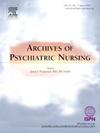Schizophrenia and cancer: Insights into psychiatric nursing care
IF 2.2
4区 医学
Q1 NURSING
引用次数: 0
Abstract
Introduction
Few studies have applied Benner's nursing theory in evaluating psychiatric nursing care for patients with schizophrenia and the complication of cancer. Further study and training are needed in the management of these diseases.
Objectives
(1) To elucidate and categorize psychiatric nursing expertise in schizophrenia and cancer according to the five stages of Benner's nursing theory. (2) To identify stage-specific learning needs for the psychiatric nursing care of schizophrenia and cancer, and to propose tailored educational programs. (3) To clarify the differences in the roles and training of psychiatric nurses in Malaysia and Japan.
Methods
A qualitative descriptive design was adopted. Semi-structured interviews were conducted with a total of 20 psychiatric nurses in Malaysia and Japan. The data were thematically analyzed and categorized with Benner's theory.
Results
Benner's five stages of proficiency were: Novices followed pre-established routines; advanced beginners focused on psychiatric symptoms and behavior; competent nurses determined and prioritized methods of care; proficient nurses flexibly adjusted care to the patient's condition; and experts lent extensive experience to the team and patients. The following learning needs were identified: Novices struggled with identifying physical and psychiatric symptoms; advanced beginners had difficulties understanding ambiguous patient statements; competent nurses needed to improve emergency response skills; proficient nurses faced ethical challenges; and experts sought to pass on their knowledge. Stage-appropriate educational programs, such as a Visual Pain and Psychiatric Symptoms Evaluation Sheet, were proposed accordingly.
Discussion
Further investigations should assess the effectiveness of these educational programs, Japanese–Malaysian cultural differences, and psychiatric liaison nursing.
求助全文
约1分钟内获得全文
求助全文
来源期刊
CiteScore
3.70
自引率
0.00%
发文量
131
审稿时长
160 days
期刊介绍:
Archives of Psychiatric Nursing disseminates original, peer-reviewed research that is of interest to psychiatric and mental health care nurses. The field is considered in its broadest perspective, including theory, practice and research applications related to all ages, special populations, settings, and interdisciplinary collaborations in both the public and private sectors. Through critical study, expositions, and review of practice, Archives of Psychiatric Nursing is a medium for clinical scholarship to provide theoretical linkages among diverse areas of practice.

 求助内容:
求助内容: 应助结果提醒方式:
应助结果提醒方式:


